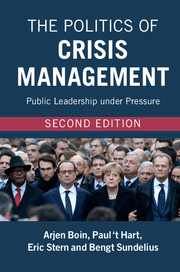Book contents
- Frontmatter
- Contents
- List of Figures
- List of Tables
- Introduction to the Second Edition
- 1 Managing Crises: Five Strategic Leadership Tasks
- 2 Sense Making: Grasping Crises as They Unfold
- 3 Decision Making and Coordinating: Shaping the Crisis Response
- 4 Meaning Making: Constructing a Crisis Narrative
- 5 Ending a Crisis: Managing Accountability
- 6 Learning and Changing: From Crisis to Reform
- 7 How to Deal with Crisis: Lessons for Prudent Leadership
- References
- Index
7 - How to Deal with Crisis: Lessons for Prudent Leadership
Published online by Cambridge University Press: 15 December 2016
- Frontmatter
- Contents
- List of Figures
- List of Tables
- Introduction to the Second Edition
- 1 Managing Crises: Five Strategic Leadership Tasks
- 2 Sense Making: Grasping Crises as They Unfold
- 3 Decision Making and Coordinating: Shaping the Crisis Response
- 4 Meaning Making: Constructing a Crisis Narrative
- 5 Ending a Crisis: Managing Accountability
- 6 Learning and Changing: From Crisis to Reform
- 7 How to Deal with Crisis: Lessons for Prudent Leadership
- References
- Index
Summary
Navigating Crises
In this book, we have presented a number of claims about leadership in times of crisis. These are based on the findings of several decades of crisis research, direct observation of crisis managers in action (in real-world settings and simulated contexts), and ongoing dialogue with experienced and reflective practitioners. In this final chapter, we translate key observations from the evolving body of crisis management research into recommendations for improving crisis management practices.
Navigating crises prudently is a complex leadership challenge. Trade-offs must be made among various key values and constraints. Policy makers must make decisions and live with the consequences of their actions or inactions. Citizens either suffer the effects of governmental unpreparedness or reap the benefits secured by well-prepared leaders and resilient institutions. Effective crisis navigation requires leaders to prepare themselves and their organizations to deal with this challenge well ahead of the moment when they find themselves in the “hot seat” of crisis. Our recommendations do not tell policy makers what to do but offer ideas and suggestions about how prudent crisis leadership might be facilitated, organized, and exercised.
Grasping the Nature of Crises
Let us begin with the nature of the beast. What is it that makes crises so difficult to handle? And what should policy makers understand about crises when they seek to enhance their crisis leadership capacities?
One of the most important things to keep in mind is that crisis is a label, a semantic construction people use to characterize situations that they somehow regard as extraordinary, volatile, and potentially far-reaching in their negative implications. Why people collectively label and experience a situation as a crisis remains something of a mystery. Physical facts, numbers, and other seemingly objective indicators are important factors, but they are not decisive. A flood that kills 200 people is a more or less routine emergency in Bangladesh, but it would be experienced as a major crisis in, let's say, New Jersey or Poland. Similarly, seasonal influenza kills somewhere between three thousand and fifty thousand persons per year in the U.S., a fact easily obscured in the media and public consciousness by the threat posed by a relatively small number of vividly portrayed imported Ebola cases.
- Type
- Chapter
- Information
- The Politics of Crisis ManagementPublic Leadership under Pressure, pp. 145 - 171Publisher: Cambridge University PressPrint publication year: 2016



